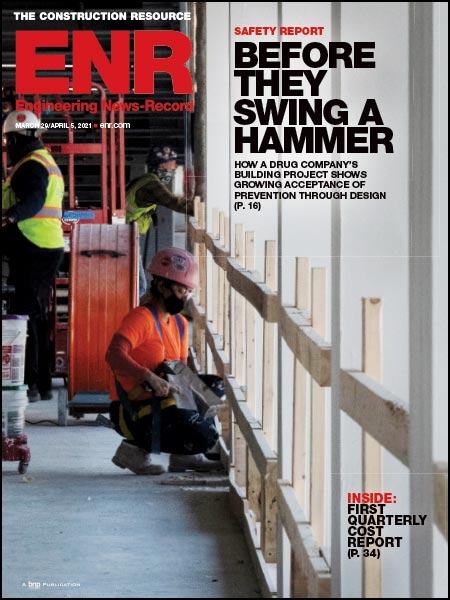 |
| UNIQUE Bridge will be first single-tower self-anchored suspension span. (Photo courteys of NewBayBridge.org/Caltrans) |
In an effort to cut costs and boost competition on its $2.6-billion San Francisco-Oakland Bay Bridge project, the California Dept. of Transportation is changing bid requirements and scheduling. In a controversial move, the agency also is allowing potential bidders to use foreign steel.
Last month, a joint venture of Kiewit Pacific, FCI Constructors Inc. and Manson Construction Co. submitted a $210-million foundation bid that came in 63%, or about $85 million, over estimate, says Dan McElhinney, chief of the toll bridge construction program for Caltrans. Caltrans will rebid the contract for the 530-ft-tall tower foundation and support structures that tie the suspension bridge deck into the Skyway approach span. Kiewit Pacific officials could not be reached for comment by press time.
In response to contractor input and the high price of the rejected sole bid, Caltrans has made key changes. One extends the construction schedule for the suspension span by 15 months, says McElhinney. Caltrans rescheduled the bid date for the bridges second-largest contract, the $740-million suspension spans superstructure, from Oct. 21 to Jan. 21.
|
Prospective bidders will now bid on time as well as labor and materials under the A plus B formula. The agency hopes the delay and changes will invite more competition. "Were expecting a good number of bidders in January," says McElhinney. Three or four joint ventures might bid on the span, he says.
Over the objections of U.S. steel producers, Caltrans will allow contractors to include foreign-produced steel in bids for the span. Contractors had expressed concern about whether the U.S. domestic market could supply the required 67,000 tons of steel, McElhinney says.
Nancy Gravatt, a spokesperson for the American Iron and Steel Institute, Washington, D.C., contends that steel prices in the U.S. are often lower than in overseas markets. Con Abnee, executive director of Chicago-based National Steel Bridge Alliance, adds that "steel bridge fabrication facilities and steel mill facilities are very interested...in working with the decision-makers to make sure that this is a domestic bridge."
But fabricators are concerned "that we dont have facilities large enough at this time to fabricate bridge deck sections that they want to go with," Abnee adds. The design of the suspension superstructure calls for parallel 25-m-wide hollow orthotropic steel boxes, 17 m apart, each accommodating five lanes of traffic.
McElhinney contends that bidding requirements offer advantages to domestic suppliers. Federal Buy American requirements mandate the inclusion of domestic structural steel in the bids. Domestic steel bids will get a 25% advantage, he says.
Procurement changes affect the bridges signature componentits innovative 1,860-ft-long suspension span. Designed by T.Y. Lin International, San Francisco, in joint venture with Moffatt & Nichol, Long Beach, Calif., the asymmetrical section will be the first-ever single-tower, self-anchored suspension span. The single cable will wrap over the tower, underneath the western end of the span, over the tower again, and anchor in the roadway deck at the eastern end, says Herb Rothman, principal in charge for Weidlinger Associates Inc., New York City, T.Y. Lins subcontractor for the span.
Nine of 16 contracts are in construction, three are advertised, and four are in design, says McElhinney. Work is about 30% complete on the bridges single largest section, the $1.1-billion Skyway east span. The 1.5-mile-long concrete segmental bridge is Caltrans largest-ever contract. A joint venture of Kiewit Pacific, FCI and Manson is on track to complete the Skyway by late 2006 or early 2007, says McElhinney. The entire project is scheduled for completion in 2010.


Post a comment to this article
Report Abusive Comment